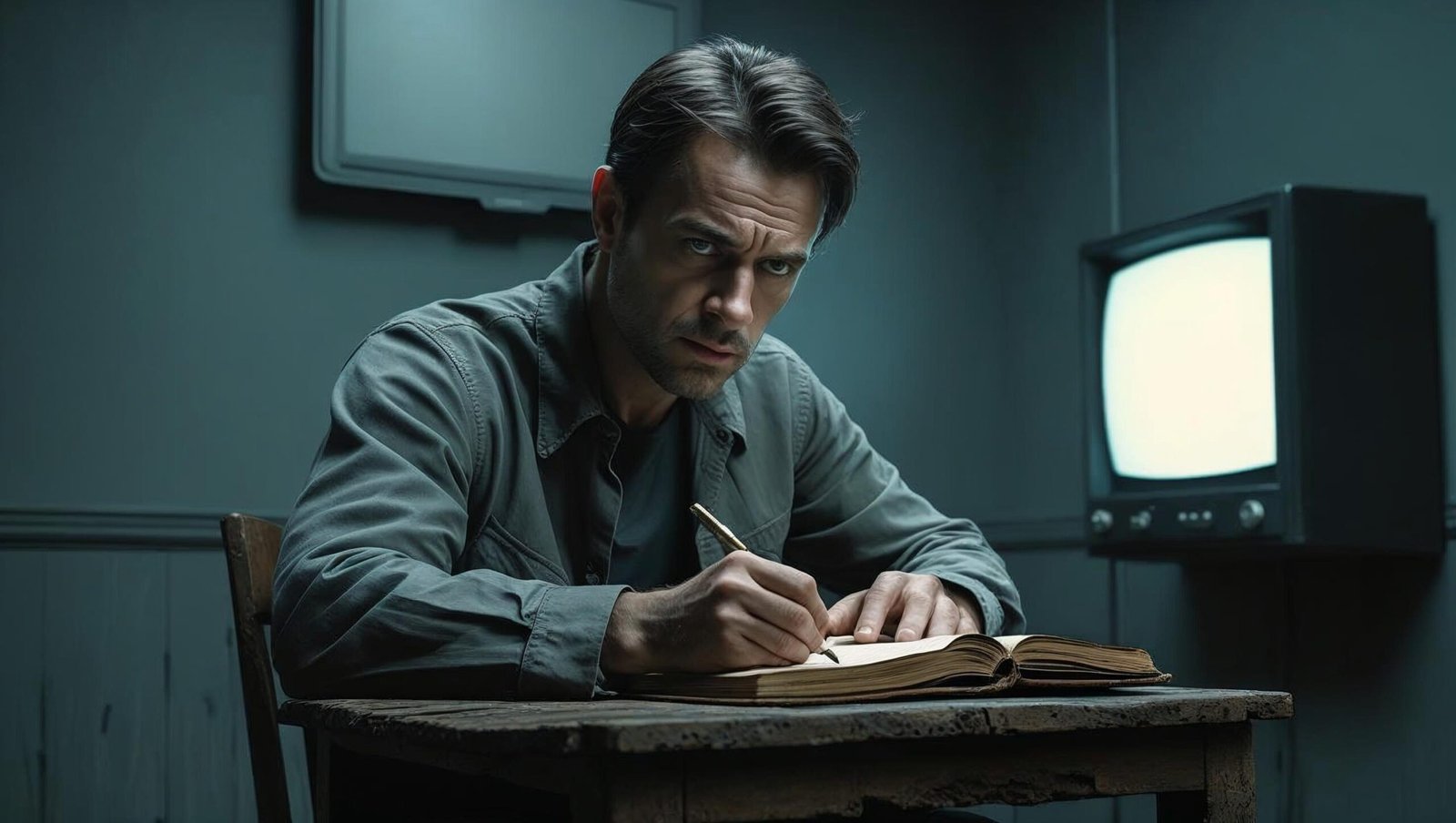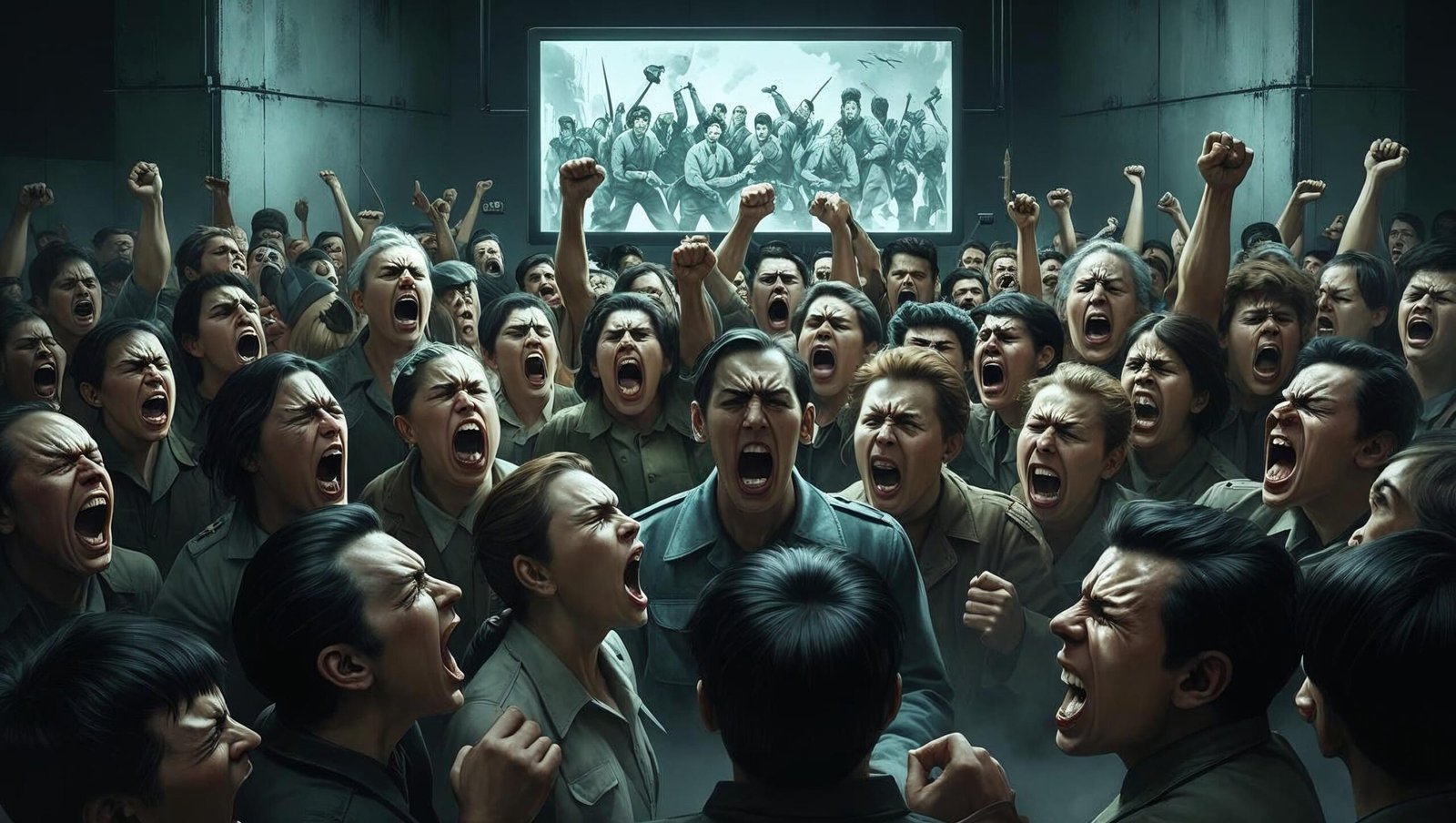Introduction
George Orwell’s 1984 is more than a novel; it is a harrowing prophecy. In this 1984 Book Review, we analyze Orwell’s 1949 masterpiece that envisioned a future drowning in authoritarian control. 1984 remains a brutal dissection of power, conformity, and thought manipulation. This 1984 Book Review unpacks Orwell’s warnings and their terrifying modern parallels.
Set in the oppressive superstate of Oceania, 1984 chronicles the life of Winston Smith, a seemingly insignificant cog in the vast machinery of the ruling Party. The Party, led by the omnipresent Big Brother, controls not only action and speech but also thought and memory. Winston works at the Ministry of Truth, where his task is to rewrite historical records, aligning them with the ever-changing Party narrative.
Tired of the perpetual deceit, Winston begins to rebel internally. He starts a secret love affair with Julia, a fellow Party worker. Their fleeting sanctuary is shattered when they are apprehended by the Thought Police. Tortured and broken in the Ministry of Love, Winston eventually betrays Julia and submits wholly to the Party, surrendering even the sanctity of his thoughts.

Plot Summary: A Core Focus of This 1984 Book Review
Set in Oceania, 1984 follows Winston Smith, a Ministry of Truth worker who alters historical records to serve the Party. This 1984 Book Review highlights his forbidden romance with Julia and their eventual betrayal – a pivotal tragedy underscoring the Party’s absolute control.
Key Themes Explored in This 1984 Book Review
Totalitarian Terror in 1984
This 1984 Book Review emphasizes how the Party obliterates free will through:
-
Surveillance: Telescreens and Thought Police dominate 1984
-
Newspeak: Language manipulation in 1984 destroys independent thought
-
Reality Control: The Ministry of Truth’s historical revisions in 1984
Psychological Horror in 1984
What makes 1984 uniquely terrifying? This 1984 Book Review spotlights:
-
Room 101’s soul-crushing torture
-
The concept of doublethink
-
Winston’s complete psychological breakdown
Central Themes in 1984
Totalitarian Control
The dystopia of 1984 is a place where the State is all-powerful. The Party exercises totalitarian control not only through force but through fear, ideology, and psychological manipulation. In 1984, Orwell warns us of a government so vast and so invasive that it extinguishes personal identity and free will.

Surveillance and the Illusion of Safety
“Big Brother is watching you” is the terrifying slogan that saturates 1984’s world. Citizens are observed through telescreens, monitored by Thought Police, and conditioned to betray their own instincts. This atmosphere of surveillance in 1984 generates a society where fear becomes habitual and obedience is internalised.
Language as a Tool of Oppression
Newspeak, the Party’s constructed language in 1984, plays a critical role in Orwell’s narrative. It limits vocabulary and simplifies thought, eliminating the possibility of rebellion by ensuring that unorthodox thoughts are literally unthinkable. The manipulation of language in 1984 becomes a weapon to reshape reality.
Reality Control and the Past
One of 1984’s most disturbing aspects is the control over history. Through the Ministry of Truth, the Party alters records and photographs, erasing inconvenient truths. This manipulation means that the past itself is fluid, determined by those in power. As Orwell chillingly wrote in 1984, “Who controls the past controls the future. Who controls the present controls the past.”
Love, Betrayal, and Human Connection
Winston and Julia’s affair in 1984 serves as a fragile rebellion against the mechanised life of the Party. Their physical union is an act of defiance, and their love, though doomed, temporarily restores their humanity. However, under torture, both betray each other, proving that love is no match for a system designed to obliterate the self.
Character Analysis in 1984
Winston Smith
Winston is 1984’s everyman character, weary and broken by the mundane oppressions of Party life. His intellectual curiosity and yearning for truth render him vulnerable. His descent from silent dissenter to brainwashed follower is painful but serves Orwell’s tragic thesis: that no individual, however determined, can withstand the monolith of a totalitarian regime alone.
Julia
Julia is pragmatic, rebellious, and sensuous. Unlike Winston in 1984, who seeks philosophical truth, Julia rebels for personal pleasure. She is less concerned with the Party’s ideology and more focused on reclaiming individual experiences. Her role contrasts with Winston’s intellectualism, and together, they symbolise different faces of resistance.
O’Brien
O’Brien is perhaps 1984’s most complex character. He appears at first to be a fellow dissident but is revealed as a loyal agent of the Party. His betrayal is made all the more terrifying by his articulate justifications for torture and control. O’Brien represents the terrifying intelligence of totalitarianism—one that understands human psychology deeply and uses it mercilessly.
Big Brother
Big Brother is never seen, never heard, and possibly does not even exist in 1984. He is a symbol—a constructed godlike figure used to inspire fear, loyalty, and obedience. The Party’s power is consolidated in his mythical omnipresence.
1984’s Relevance in Contemporary Society
The predictive power of 1984 is undeniable. In an age where technology enables mass surveillance, where governments and corporations harvest data, and where misinformation spreads virally, 1984’s warnings ring more urgently than ever. The manipulation of language, the rewriting of facts, and the erosion of privacy in 1984 have all become real and present dangers.
The rise of populist regimes, censorship, and algorithmic control underscores 1984’s prescience. Today, Orwell’s message is not merely literary—it is a clarion call to safeguard democracy and truth.

Literary Style and Structure of 1984
Orwell’s prose in 1984 is economical, deliberate, and unsparing. His descriptions are stark, his dialogue restrained, and his imagery visceral. 1984’s structure mirrors Winston’s psychological deterioration—from initial rebellion to tragic submission. Orwell’s precise and unflinching narrative voice serves to intensify the novel’s philosophical gravity.
Moral and Philosophical Implications of 1984
1984 forces us to confront the fragile boundaries between liberty and control, between truth and illusion. It compels readers to examine their relationship with authority, to question the narratives they accept, and to defend their mental autonomy. 1984 is not simply about politics—it is about what it means to be human.
Notable Quotes from 1984 and Their Significance
-
“War is peace. Freedom is slavery. Ignorance is strength.”
This paradoxical slogan from 1984 encapsulates the concept of doublethink, the capacity to hold two contradictory beliefs as true, and underscores the Party’s strategy of psychological manipulation. -
“Freedom is the freedom to say that two plus two make four.”
A line from 1984 that appears simple, but which symbolises the right to objective truth. Winston clings to this assertion as his last refuge of sanity. -
“If you want a picture of the future, imagine a boot stamping on a human face—forever.”
Perhaps the most haunting image in 1984, this line conveys Orwell’s vision of an endless cycle of oppression.
Orwell’s Prose and Literary Craftsmanship in 1984
One of the often-overlooked elements in any comprehensive 1984 Book Review is the brilliance of Orwell’s writing style itself in 1984. His prose is unadorned yet evocative, lean yet powerful. Each sentence in 1984 bears the weight of truth and fear. Unlike the florid expressions that defined much of early 20th-century literature, Orwell writes with the severity and precision of a surgeon. His deliberate simplicity is a stylistic weapon—it mirrors the starkness of the world he depicts in 1984.
Orwell’s writing in 1984 does not aim to entertain; it aims to alarm. The bleakness in his language mirrors the emotional and psychological erosion of his protagonist. The sentence structure, often clipped and functional, mimics the constriction of thought itself. Thus, when a reader engages with this 1984 Book Review, it is crucial to acknowledge that the narrative’s terrifying power is amplified by Orwell’s austere narrative technique in 1984.

1984’s Relevance to Modern-Day Digital Surveillance
To fully appreciate this 1984 Book Review, one must recognize how prophetic Orwell’s vision in 1984 was. In today’s digital age, where data is harvested, algorithms predict behavior, and mass surveillance is normalized in the name of convenience and security, 1984’s “Big Brother” takes on renewed relevance. While the technologies may differ, the underlying dynamics—surveillance, behavioral manipulation, loss of privacy—remain chillingly aligned with Orwell’s depiction in 1984.
Consider how corporations track online activity or how state-sponsored surveillance tools monitor communications. The telescreen of 1984 has evolved into the smartphone camera, the smart speaker, the GPS chip. This parallel invites a crucial reflection: are we too complacent, just as the citizens of Oceania were in 1984? A worthy 1984 Book Review cannot ignore the eerie echoes between Orwell’s world and our own digital landscape.
Philosophical Depth in 1984: Free Will and Determinism
A rich 1984 Book Review must also consider the philosophical core of Orwell’s work in 1984. At its essence, the novel grapples with the concept of free will. Through the character of Winston Smith in 1984, Orwell dramatizes the battle between the individual and the system. Winston’s struggle is not merely against political tyranny but against a more insidious threat: the erasure of his own thoughts and desires.
When Winston attempts to write in a diary, engage in love, or even question the past in 1984, he challenges the deterministic structure imposed by the Party. However, Orwell shows that in a system as complete as Big Brother’s in 1984, even dissent becomes futile. This deterministic vision—the notion that one’s reality is shaped entirely by external controls—creates an existential horror that deepens the impact of this 1984 Book Review.
1984 as a Psychological Horror Story
Many readers classify 1984 as political fiction or dystopian literature. But 1984 can equally be read as a psychological horror story. The fear instilled in Winston is not born from monsters or ghosts but from omniscient authority in 1984. The concept of “doublethink” alone in 1984, the ability to hold two contradictory truths simultaneously, is a psychological manipulation so intense that it corrodes sanity.
In Room 101 in 1984, Orwell takes psychological terror to its apex. The moment Winston betrays Julia marks not just a physical breaking point, but a moral and spiritual one. In that scene, Orwell is not merely depicting torture—he is illustrating the terrifying power of a system to make someone betray their own soul. A 1984 Book Review must give due regard to this chilling psychological narrative in 1984.
Character Analysis: Critical to Any 1984 Book Review
Winston Smith
The doomed protagonist of 1984 represents crushed rebellion. This 1984 Book Review notes his transformation from skeptic to broken loyalist.
Big Brother
Though never physically present in 1984, his symbolic power fuels the Party’s control – a key point in this 1984 Book Review.
Why This 1984 Book Review Matters Today
Modern readers of 1984 confront chilling realities:
-
Mass digital surveillance mirroring 1984’s telescreens
-
“Fake news” echoing 1984’s reality manipulation
-
Declining privacy rights resembling 1984’s dystopia
This 1984 Book Review serves as both literary analysis and urgent warning. Orwell’s 1984 remains indispensable for understanding power’s corrosive potential.
1984’s Global Impact and Legacy
No thorough 1984 Book Review can ignore the novel’s global impact. Orwell’s ideas in 1984 have permeated not only literature but also politics, philosophy, sociology, and cultural studies. Terms such as “Orwellian,” “Big Brother,” “doublethink,” and “thoughtcrime” from 1984 have entered the global lexicon and are frequently used to critique real-world abuses of power.
From totalitarian regimes in North Korea to political propaganda campaigns in the West, from manipulated media coverage to censorship in academic institutions, 1984’s themes remain shockingly relevant. In nations where freedom is eroded, 1984 is often banned—because it hits too close to home. In free societies, 1984 is taught as a warning. A compelling 1984 Book Review must acknowledge that Orwell’s novel is not just a relic of Cold War anxiety—it is a timeless lens through which the hunger for power can be studied.
Comparing 1984 with Other Dystopian Works
While 1984 stands as a towering figure in dystopian literature, a comparative lens enriches our understanding of Orwell’s contribution. Aldous Huxley’s Brave New World, for instance, also imagines a future where autonomy is sacrificed, but through pleasure rather than fear. Ray Bradbury’s Fahrenheit 451 depicts a society numbed by entertainment and censorship. Margaret Atwood’s The Handmaid’s Tale explores the intersections of patriarchy, religion, and control.
What makes 1984 distinct, and worthy of such an extensive 1984 Book Review, is its merging of physical oppression with intellectual subjugation. It is not enough for the Party in 1984 to own your body; it must own your mind. That psychological conquest is what gives 1984 a uniquely harrowing edge.
Lessons from 1984 for Future Generations
A profound 1984 Book Review also includes the educational imperative of Orwell’s work. For younger generations raised in the era of social media, instant gratification, and filtered reality, 1984 offers a sobering contrast. 1984 warns against the perils of apathy, the consequences of relinquishing control over truth, and the danger of allowing technology to overtake conscience.
Educators, parents, and thought leaders must use 1984 not merely as literature but as a moral compass. Each page of 1984 is a lesson in vigilance, resistance, and the preservation of human dignity. 1984’s enduring relevance is a clarion call for critical thinking in an age increasingly hostile to it.
The Impact of 1984 on Political Thought
This 1984 Book Review would be incomplete without acknowledging the novel’s profound influence on political discourse worldwide. Orwell’s depiction in 1984 of surveillance, propaganda, and loss of freedoms has shaped how we think about government overreach. The term “Orwellian” from 1984 frequently appears in critiques of authoritarian policies, showing how deeply this book resonates in discussions of civil liberties today. 1984’s warnings continue to serve as a framework for safeguarding democracy.
Psychological Manipulation and Its Consequences in 1984
In this 1984 Book Review, Orwell’s insight into psychological manipulation in 1984 is especially chilling. The Party’s use of doublethink and fear distorts reality and coerces loyalty. This systematic brainwashing in 1984 results in a population that cannot trust its own memories or thoughts. Such psychological control highlights the devastating effects of oppressive regimes on the human mind, reinforcing why 1984 remains essential reading in understanding totalitarianism.
Symbolism and Imagery in 1984
A critical part of any 1984 Book Review is the examination of Orwell’s rich symbolism in 1984. Big Brother represents omnipresent government control, while the telescreens symbolize constant surveillance. The bleak urban landscape in 1984 mirrors the hopelessness of the citizens. Orwell’s use of stark imagery in 1984 intensifies the oppressive atmosphere, immersing readers in a world where individuality is crushed. These literary devices deepen 1984’s impact and timeless relevance.
Why 1984 Remains Relevant to Readers Today
This 1984 Book Review underscores the novel’s ongoing relevance in a digital age. Modern concerns about data privacy, misinformation, and state monitoring echo 1984’s warnings. Readers find 1984 a compelling reminder that vigilance is necessary to protect freedoms. 1984’s exploration of truth and identity challenges us to question the information we receive daily, making 1984 a powerful and enduring cautionary tale.

FAQs About 1984
What is the significance of the title 1984?
The title 1984 serves as a projection of the near future from the date of the book’s writing. It signals a warning that dystopia is not centuries away, but just around the corner if vigilance is not maintained.
Why is the character of Winston important in 1984?
Winston is 1984’s lens through which readers experience the full brutality of the Party. His journey highlights the limits of individual rebellion in a totalitarian regime.
Is 1984 still relevant today?
Absolutely. With current debates around surveillance, fake news, censorship, and authoritarianism, 1984’s vision is eerily applicable to modern global issues.
What is Newspeak in 1984, and why is it dangerous?
Newspeak is the language created by the Party in 1984 to eliminate personal thought. By reducing the complexity of language, it limits the scope of thought itself—a chilling instrument of control.
What is Room 101 in 1984?
Room 101 in 1984 is where a person’s worst fears are realised. It is the ultimate tool of torture used by the Party to break down the human spirit completely.
Conclusion
1984 remains one of the most chilling and intellectually provocative novels of the 20th century. Orwell crafts not merely a tale of despair, but a philosophical meditation on truth, freedom, and the human condition. 1984’s warnings are not relics of the past but imperatives for the present. This 1984 Book Review serves as both homage and alarm—reminding us that the price of liberty is eternal vigilance.
To read 1984 is to awaken. To awaken is to question. And to question is the first act of freedom.
Reader’s Corner:
-
What are your thoughts on 1984’s predictions?
-
Have you ever felt the weight of surveillance in your own life?
Share your reflections in the comments and let us uphold the right to question and to think.
For more insightful book reviews and literary analysis, visit shubhanshuinsights.com